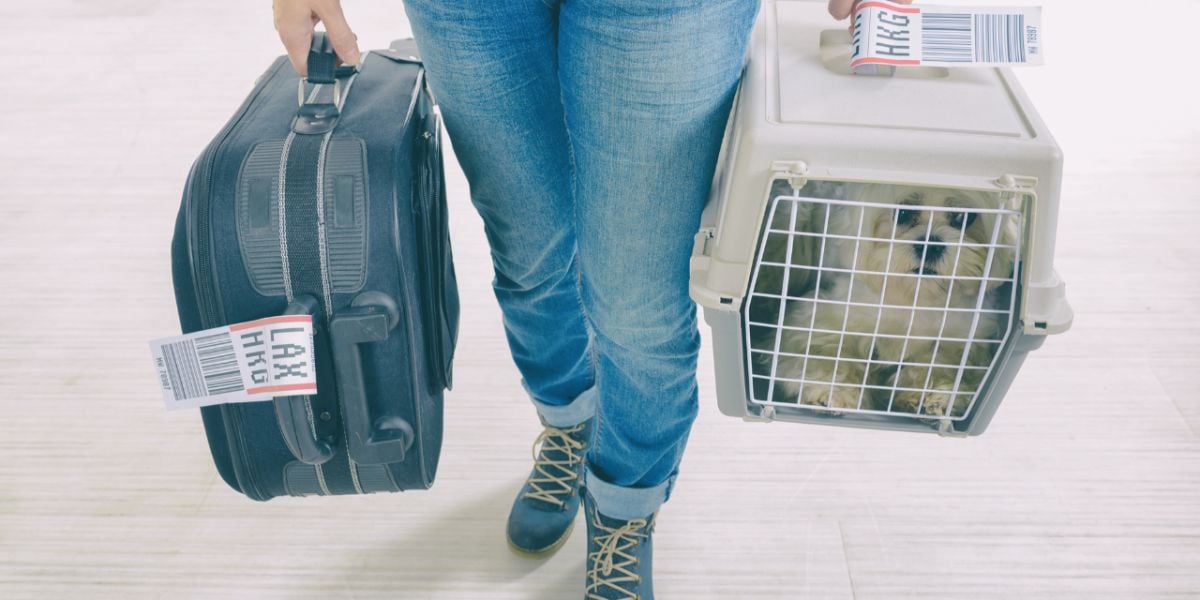
If you wish to move to the United Arab Emirates with your pet, you should seek information on import formalities with the Emirati authorities based on your country of origin. Firstly, check that your pet is allowed to enter the United Arab Emirates. Afterward, you will need to follow the import procedures, sanitary requirements, and health formalities before your pet is allowed to travel.

You can also inquire with your carrier about pet travel or contact a company that specializes in pet transportation.
Good to know:
You are advised to seek all relevant information well in advance as the procedures can take a lot of time.
Formalities for entering the UAE with your pet
For first-time travel, that is, if your pet is entering the United Arab Emirates for the first time, there are import formalities to follow. First of all, your pet must be fitted with a non-encrypted identification microchip that is compliant with ISO 11784 or ISO 11785 norms. Note that AVID 9 and AVID 10 are also accepted. It is important that the microchip is inserted before the rabies vaccination.
Your pet will need to have its original Rabies Certificate signed by your vet. The rabies vaccine must be administered between 21 days and 12 months before your pet's scheduled arrival date in the UAE. A rabies titer test will then be required. The results will be obtained from a lab, so that might take some time. The result of this rabies titer test must be 0.5 IU/mL or above. The test must be conducted within 90 days prior to arriving in the UAE.
Vaccines are also required. This is different for cats and dogs, so it's best to check the specific ones required for your pet from the relevant authorities. In most cases, dogs must be vaccinated against distemper, canine hepatitis, leptospirosis, and parvovirus. Cats require vaccines against rhinotracheitis Feline, calicivirus, and panleukopenia.
You then have to request an import authorization from Emirati authorities, more specifically the Ministry of Environment and Climate Change, either online or in person if you are already in the UAE. This document must be filled out and submitted before importing your animal, as it is valid for only 30 days from the date of issue. Note that each import license applies to two pets.
You will also require an APHIS Form 7001 and a USDA certificate.
Make sure to check the specific requirements for your country, as these may vary. Some countries require more procedures if they are not rabies-free or rabies-controlled. The following is the list of countries that are considered rabies-free by the United Arab Emirates: Albania, Australia, Austria, Andorra, Bahamas, Barbados, Belgium, Bulgaria, Croatia, Cyprus, Czech Republic, Denmark, Estonia, Fiji, Finland, French Polynesia, Falkland Islands, Germany, Greece, Hong Kong, Iceland, Ireland, Italy, Jamaica, Japan, Korea, Kuwait, Latvia, Liechtenstein, Lithuania, Macedonia, Maldives, Marshall Islands, Mauritius, Malta, Micronesia, Montenegro, Netherlands, New Caledonia, New Zealand, Palau, Portugal, Singapore, San Marino, Seychelles, Slovenia, Spain, Suriname, Sweden, Switzerland, United Kingdom, and Vanuatu.
Note that all pets have to arrive in the United Arab Emirates by air at either of these airports:
- Abu Dhabi Airport;
- El Bateen Airport;
- Ras al Khaimah Airport;
- Dubai Airport;
- Al-Ain Airport;
- Sharjah Airport;
- Fujairah Airport;
- Ajman Airport.
You are allowed to import a maximum of two pets.
Good to know:
Pets coming from Europe must not only wear an identification microchip but also hold a pet passport.
Restrictions and bans on pets traveling to the UAE
The following dog breeds are not allowed into the UAE: Pit Bull Terrier or American Pit Bull Terrier, Japanese Tosa (Tosa, Tosa Fighting Dog), combat dog Argentine (Dogo Argentino, Argentine Mastiff), Brazilian fighting dog (Brasileiro Fila, Brazilian Mastiff), wolf-dog hybrid (any dog mixed with a wolf), American Staffordshire Terrier or Staffordshire Bull Terrier, American Bully breed or hybrid Rottweilers, Doberman, Presa Canario, Cane Corso (Italian Mastiff), Tibetan Mastiff, Neapolitan Mastiff, French Mastiff, Boerboel Bullmastiff, Bully Kutta, and Boxer.
Invertebrates, tropical fish, reptiles, amphibians, rodents, and rabbits can be imported into the country, provided that they have a health certificate.
The entry of birds is only permitted from certain countries, which frequently changes, so it's best to check with the relevant authorities before starting with any procedures.
In case your pet is not yet old enough to be vaccinated, it could be prohibited from entering the country.
In all cases, you are strongly advised to seek information from the Ministry of Climate Change and Environment.
Traveling to the UAE with your pet
Most airlines will allow you to fly with your pet. However, the cost and conditions in which your pet will be transported will differ from one carrier to another.
Check your chosen airline's pet policies prior to your trip. It is generally a good idea to contact the airline representative and inquire about transporting your pet.
Different airlines implement different rules for flying with pets, the breeds that are allowed on board, the size and weight of the pet and more. Transportation costs will also differ.
Some airlines allow passengers to travel with a small pet in the cabin. This option is generally available for cats and dogs under 8kg.
If you are traveling with a larger pet, it will need to be transported in a special cargo area — a climate-controlled pet zone where your pet should be comfortable throughout the flight.
Your pet needs to travel in a comfortable International Air Transport Association (IATA)- approved cage. Check with your chosen carrier in advance for any specific requirements.
Most airlines will ask for the following when transporting your pet:
- The pet carrier must be without wheels;
- It must have a roof;
- If the cage consists of two sections, the screws holding the two parts together must be properly installed and tightened;
- The cage must have firmly attached bowls with food and water that should be enough for your pet during the trip;
- The cage must be clean and waterproof;
- It must be well-ventilated and have openings on all four sides;
- The cage must be properly locked — and the lock shouldn't open from the inside;
- Finally, it must have two clearly visible labels: the “live animal” label and the label indicating where the top and bottom of the cage are.
Make sure your pet has enough space in the cage. It needs to be able to turn and stand and have easy access to food and water.
Most airlines will also require that your pet be “flight ready”. “Flight readiness” is defined by several factors and generally means that your pet is healthy and well-behaved in public.
On arrival in the UAE
Upon its arrival in the United Arab Emirates, your pet will be examined by the customs department. It will also be examined by a licensed veterinarian to whom you will have to produce its health and vaccination certificate.
Good to know:
The UAE does not impose a quarantine on pets – a great comfort to most expats moving with their furry friends.
Living in the UAE with pets
When looking for a place to live, it's important to check with your landlord about pet policies. Even in buildings that do not allow pets, landlords can be quite flexible on the rules. There are plenty of pet-friendly accommodations in the UAE, so you'll be able to find something to suit your specific needs.
If you live with a pet, you must have a car, as it is not allowed to bring it on public transportation. However, in some emergency cases, taxis might permit it, as long as your pet is in a crate.
You'll find an abundance of pet stores throughout the country, as well as veterinarians that offer 24-hour emergency care:
- Pet Connection, Dubai 055 223 0641 (emergency);
- British Veterinary Center UAE, Abu Dhabi 050 823 0780 (emergency);
- Umm Suqeim Veterinary Center 04-321-0799 / 04-348-3799;
- Vets 24 Veterinary Clinic, Ras Al Khaimah 07 243 6600 / 050 487 6041;
- Vetland Veterinary Clinic, Ajman 050 221 4462;
- Vet Plus Center, Sharjah 06 555 4558.
Another important factor to keep in mind is the pet-specific fines that are enforced across the UAE. These include walking dogs without a leash in public, which could cost you AED 5,000, and failing to vaccinate your pet, which results in a fine of between AED 150 and AED 500.
Overall, the UAE has become more and more accommodating for people with pets. Lots of cafes and restaurants allow owners to bring their furry friends along, like 1762 JLT in Dubai and all of the Yas Bay restaurants in Abu Dhabi. There are also a number of pet-friendly beaches across the UAE, such as Palm West Beach in Dubai and Kite Beach in Umm Al Quwain.
Useful links:
Ministry of Climate Change and Environment
Etihad Airlines - Travelling with Pets
We do our best to provide accurate and up to date information. However, if you have noticed any inaccuracies in this article, please let us know in the comments section below.








